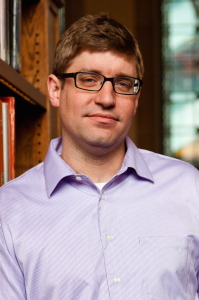
Hillsdale’s own Associate Professor of Music Mathew Fuerst may be best-known on campus for assisting with student compositions, but he is also an acclaimed composer in his own right.
His works are regularly featured in performances throughout the United States and even Europe. Most recently, the Amernet String Quartet performed two of Fuerst’s compositions — “String Quartet No. 1” and “String Quartet No. 2” — at a Sept. 24 concert at Merkin Concert Hall in New York City’s Kaufman Music Center.
“I thought they did an excellent job,” Fuerst said. “I enjoyed working with them and look forward to working with them some more.”
Although “String Quartet No. 2” premiered at Hillsdale College in 2013, this performance served as its New York premiere, and was lauded by the New York Classical Review as standing out “for its focus, direct communication, and force.” According to Fuerst, the inspiration for the piece was a fascination with the Big Bang and Multiverse theories.
“String Quartet No. 1” was originally commissioned by the New York City Ballet’s Choreographic Institute and premiered in 2011. According to Fuerst, it was at a New York City Ballet performance of this work that he had one of the most memorable moments of his composition career. At the end of the performance, he got to stand and take a bow on stage at the Miller Theatre — the same stage on which many incredible artists, such as Stravinsky, Balanchine, and Copland, had stood.
“I just thought, ‘What the heck am I doing here?’” Fuerst said.
Fuerst began composing around the age of 8 or 9. He remembers being “blown away” by hearing Beethoven’s “Ode to Joy,” and then using his allowance money to buy a record of some of Beethoven’s music.
“I decided from then on that I wanted to do to other people what that music was doing to me,” he said.
Fuerst studied music at the Interlochen Arts Camp, attended a high school that specialized in the arts, attained his bachelor’s degree at the Eastman School of Music in Rochester, New York, as a piano and composition major, and then attained his master’s degree and doctorate at The Juilliard School.
Fuerst has composed mostly for violin and piano, but also for orchestra, wind quartet, solo piano, voice, and “basically for whoever asks.” He has written pieces for two Hillsdale College faculty members in particular: Director of Keyboard Studies Brad Blackham and instructor in percussion Stacey Jones-Garrison.
“His music is not easy,” Blackham said, “but it’s very satisfying once you learn it.”
Blackham describes Fuerst’s music as rhythmically-driven and having a “real infectious energy.” Fuerst composed a song cycle called “Struwwelpeter” for Blackham and Adjunct Instructor Kristi Matson. The work is based on poems by Heinrich Hoffman, which are similar to the Grimm fairy tales, according to Blackham. Blackham describes Fuerst’s style as “traditional, but not stodgy.” He appreciates Fuerst’s refusal to join a recent trend toward a pop-crossover style in classical music.
Fuerst had never written for percussion until Jones-Garrison asked him to compose a piece for percussion and piano, and he presented her and Blackham with “Broken Cycles.” Jones-Garrison describes his music as “unexpected,” “forward-thinking,” and “fierce.”
“He never writes what you expect, and I think that’s a very good, refreshing thing,” she said.
